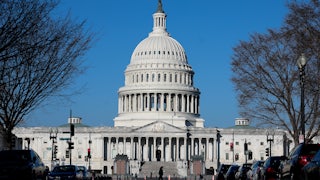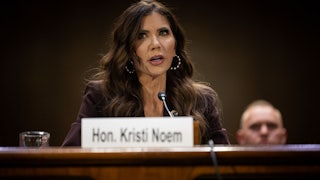Donald Trump shocked nobody on Monday when he announced J.D. Vance as his running mate. All signs had been pointing toward the Ohio senator in recent weeks, and it’s hardly surprising that he would choose a sycophant and relative neophyte to share the stage with at this week’s Republican convention. Yet the decision does in fact represent a serious departure for Trump, one that ought to raise more concerns about his plans for a potential second term as president.
Trump has a singular obsession in life, and that’s to win—at all costs, by any means. If he has to cheat, like he frequently does at golf, he’ll do it. If he has to lie, he’ll do that as well. And contrary to popular belief, he won’t hesitate to strike a compromise to get ahead. For instance, he has settled differences with people he’d previously bitterly feuded with, like Steve Wynn or Carl Icahn, in order to make deals that benefit him.
Trump’s entire ideology derives predominantly from three men: his father, Fred Trump, who taught him to love money and power; the Reverend Norman Vincent Peale, who believed that greed was an acceptable trait and that riches were a sign of divine approval; and Roy Cohn, the infamous attorney and McCarthyite who advocated for fighting at all costs and terrorizing your opponents until they succumbed to your wishes.
From these three men, Trump developed his core philosophy and his general strategy for success: Go after what you want, come on strong, fight hard, and make whatever deals necessary to get ahead. But for Trump, winning is not merely about getting richer, or the alpha male satisfaction of dominating an opponent; it’s also about getting recognition for it.
Trump told The New York Times in 1980 that, as an 18-year-old witnessing the unveiling of the Verrazano-Narrows Bridge, he saw the aging architect Othmar Ammann as a “sucker” for allowing others to receive much of the praise instead of soaking up the limelight—“this 85-year-old engineer who came from Sweden and designed this bridge, who poured his heart into it, and nobody even mentioned his name.” Ammann was from Switzerland, but nevertheless: Trump determined at that moment that he would never be like that. He would always get the credit and adulation he felt he deserved.
This is a paradox of narcissism: The narcissist wants only to elevate himself, yet he needs to work with, cajole, and convince others of his greatness. Trump has long proven willing to make any deal to advance this goal—that is, to balance his narcissism with his desire to win. When he needed to please evangelicals to have a shot at the presidency, he chose Mike Pence. When he needed to get more ideological conservatives on board, he worked with the Heritage Foundation and approved a preselected list of Supreme Court nominees.
Yet when it came to choosing his running mate this year, Trump abided by none of his previous guideposts. Had he picked Nikki Haley or Marco Rubio, he could have attracted more female voters or Latino voters, respectively, and both options would have appealed to voters looking for a younger, establishment Republican to moderate his antidemocratic tendencies and, if necessary, complete his term in office.
Vance does none of those things. He comes from a state, Ohio, that Trump was going to win anyhow. He brings Trump no benefit in terms of attracting voters who might somehow still be on the fence or looking for an excuse to vote for Trump despite all his inadequacies. So why pick him? Trump was probably seeking two things: someone who will never challenge him, like Pence did, and someone who will never soak up any of the limelight, making Trump look like a sucker.
In one regard, then, this is a relief for Democrats: Trump’s pick of Vance makes this a more competitive race at a time when the party of sanity is in some disarray over the issue of Biden’s age. But it’s also worrying. He has campaigned on “retribution,” promising to “root out” the “vermin” who oppose him, and now he has picked an obvious lackey who will never challenge him—who may even, given how quickly he blamed Biden for Trump’s shooting, enable and encourage the president’s worse impulses. For all we know, that’s exactly why Trump picked him.






